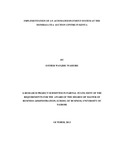| dc.contributor.author | Waheire, Esther W | |
| dc.date.accessioned | 2013-11-11T09:29:55Z | |
| dc.date.available | 2013-11-11T09:29:55Z | |
| dc.date.issued | 2013-10 | |
| dc.identifier.citation | Waheire,Esther W.,October,2013.Implementation Of An Automated Payment System At The Mombasa Tea Auction Centre In Kenya. | en |
| dc.identifier.uri | http://erepository.uonbi.ac.ke:8080/xmlui/handle/123456789/58433 | |
| dc.description.abstract | This study aimed at establishing the challenges of implementing an Automated Payment
System at the Mombasa Tea Auction in Kenya. The researcher used descriptive survey
research design since the information gathered involved administering questionnaires.
The study population for this research were all participants of the Mombasa Tea Auction
Centre as at 1st July 2013. The targeted sample size was 50 respondents. The researcher
employed proportionate stratified sampling to select the respondents of the study from the
study’s population. The data collected was quantitative in nature and was collected using a
structured questionnaire containing closed questions. Collected data was edited, coded and
classified so as to present the results of the data analysis in a systematic and clear way. The
researcher collected data in large quantity which was organized in such a way that further
analysis and interpretation of data was made easy. The descriptive statistics were used to
analyze quantitative data using three major descriptive statistics for each single variable
namely: distribution; central tendency; and dispersion.
Findings on the importance of certain factors in posing challenges in the implementation of
Automated Payment System at the Mombasa Tea Auction indicated that legal restrictions
promulgated by the EATTA or contractual obligations that bind many parties posed the
highest challenge in the implementation of Automated Payment System at the Mombasa Tea
Auction. Findings further indicated that constantly engaging with the EATTA and other
stakeholders as new issues arise with a view to get a resolution or system upgrade was the
most undertaken activity in order to cope with the challenges of the Automated Payment
System at the Mombasa Tea Auction. The researcher made several recommendations
including but not limited to; EATTA should reduce the legal restrictions promulgated or
contractual obligations that bind many parties as this posed the highest challenge in the
implementation of Automated Payment System at the Mombasa Tea Auction. This could be
done by redrafting the existing contractual laws and processes with an aim of making it easier
and simpler for members to get into legal and binding agreements. | en |
| dc.language.iso | en | en |
| dc.publisher | University of Nairobi | en |
| dc.title | Implementation of an Automated Payment System at the Mombasa Tea Auction Centre in Kenya | en |
| dc.type | Thesis | en |
| local.publisher | School of Business | en |

